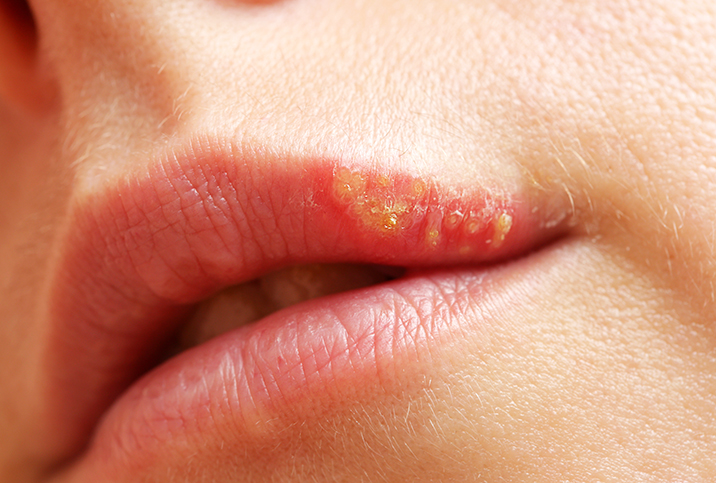Herpes, Pregnancy and Early Parenthood

For most adults, dealing with herpes is little more than a nuisance. But for pregnant women and new mothers, risks are more serious because it's possible to pass the virus to their child. However, with a little care, this is preventable.
Herpes simplex virus (HSV), medically speaking, is the cause of a common sexually transmitted disease (STD). There are two main types of the virus, HSV-1 and HSV-2. Both can cause oral and genital herpes, though HSV-1 is generally tied to oral herpes and HSV-2 is associated with genital herpes. Oral herpes causes sores or blisters on the mouth and throat; genital herpes manifests as lesions on the genitals, butt, thighs and anus. Both conditions result in pain and itchiness.
Initial symptoms can begin two to 12 days after exposure and may include a flu-like reaction, headache and fever. Symptoms are recurrent and may appear during times of stress. HSV has no cure, but it can be treated with antivirals and other medications to reduce the occurrence and duration of symptoms.
Transmission risk
The virus is spread through skin-to-skin contact and by touching sores and then touching other parts of your body, or someone else's, even if you don’t have visible lesions.
Oral herpes won’t spread to your child during pregnancy or labor, but genital herpes can be transmitted from mother to child during pregnancy and delivery. Outbreaks of genital herpes during pregnancy, particularly if it’s a woman’s first outbreak, can be serious. The risk of transmission during labor while the mother is experiencing an initial outbreak is as high as 57 percent, compared with just 2 percent for subsequent episodes. One baby out of about every 3,500 born in the United States each year has neonatal herpes simplex. And the risks aren't limited to a full-term delivery. A woman who has herpes can also experience a miscarriage or premature labor.
After labor, mothers can give the disease to their children: Oral herpes can pass through kisses or by sharing infected straws, utensils or other objects.
Knowing how to prevent transmission during delivery is crucial, because HSV can be devastating to a newborn. Exposure during birth can cause blindness, encephalitis (inflammation of the brain), brain damage, difficulty breathing and even death.
Preventing transmission of herpes
Antiviral medications (acyclovir, valacyclovir) reduce the risk of transmission of oral or genital herpes to another person. Additionally, studies have shown that antiviral medications taken late in pregnancy can help prevent transmission to the newborn, thus reducing the necessity of a cesarian section (often recommended if a woman has an active genital herpes outbreak when she goes into labor).
An exposed newborn will receive systemic antiviral therapy, such as intravenous acyclovir, to reduce the risk of complications. Irritability, sores or blisters anywhere on the body, trouble breathing (grunting, rapid breathing, periods of no breathing or turning blue), jaundice and bleeding easily may be signs that a child has been infected with HSV. Immediate treatment at an emergency room is required.
After labor, the risk of spreading genital herpes to your child is very low. If you have an outbreak, avoid touching any sores, wash your hands carefully and take antivirals if they are prescribed. Oral herpes, on the other hand, can easily be spread to children. If you are in the middle of an outbreak, avoid kissing them or sharing any utensils, cups, straws, washcloths, towels and so on.
Clearing up misconceptions
The herpes virus isn’t spread by sharing living facilities. You won’t pass it by cuddling with your kids in bed, or if you take a bath or shower or swim together. Using the same toilet and washing clothes in the same washing machine are both safe. Breastfeeding is fine, as long as the baby can’t come into contact with any open sores. Wash your hands (soap and water is fine), don’t stress and enjoy your time with your children.
Finding confidence & support
Though it is common, having HSV carries a stigma: Many people feel ashamed or embarrassed when diagnosed. That doesn't have to be the case. Seek treatment and consider joining a helpful support group. If you're dating, it’s essential to be completely upfront with partners about your status and to take precautions to protect others.
If you’re pregnant and have HSV, or even think you do, tell your doctor, who will test you, prescribe appropriate medications and talk you through preventing transmission to your baby.
HSV is a nuisance, but with treatment and proper precautions, it doesn’t have to overwhelm your life, and you can live confidently knowing your child is safe.


















